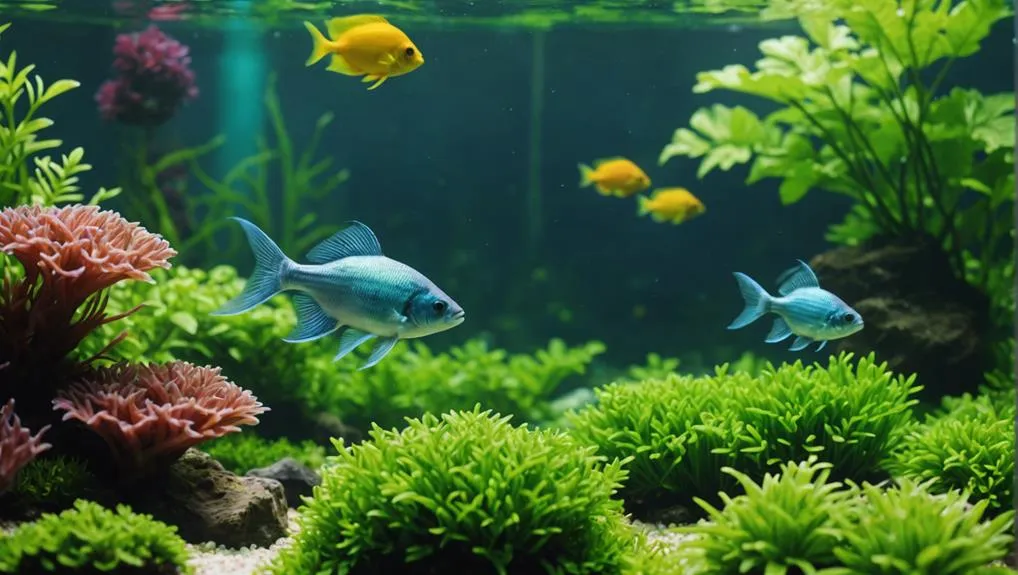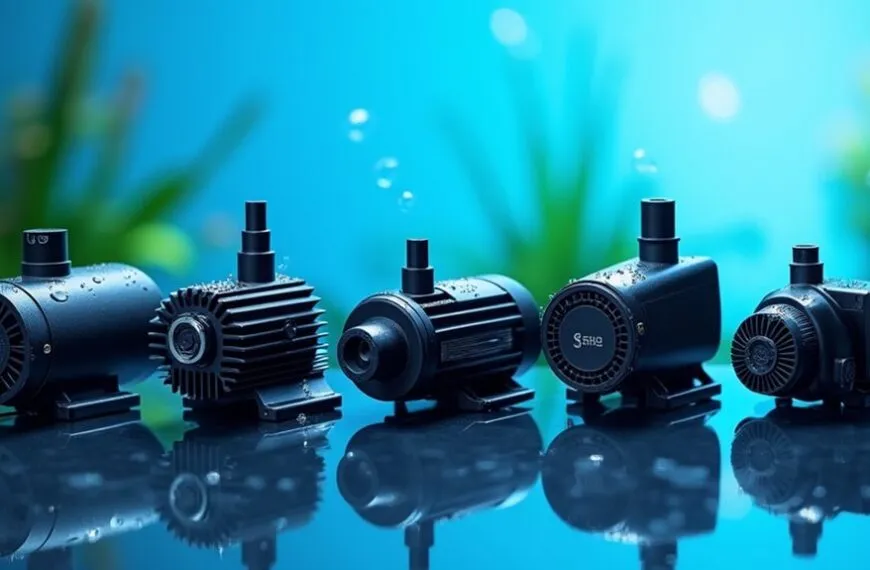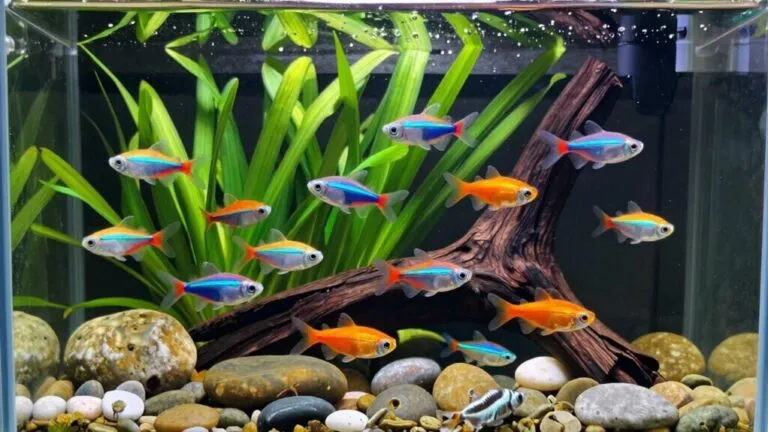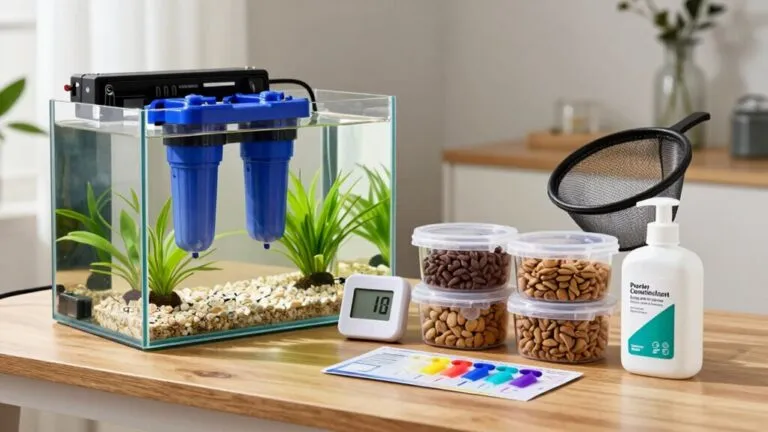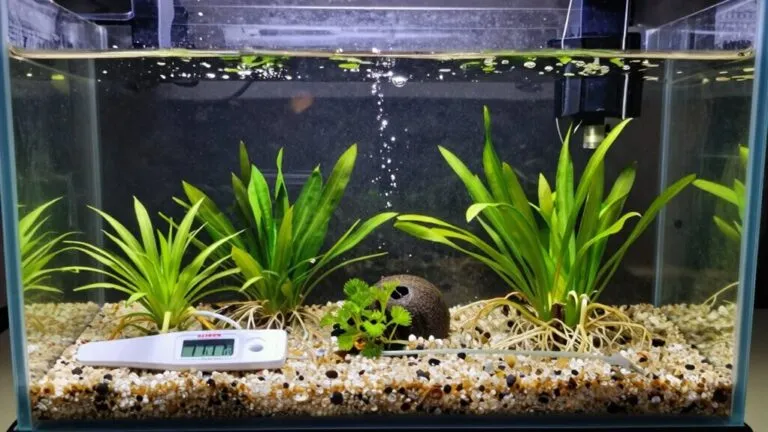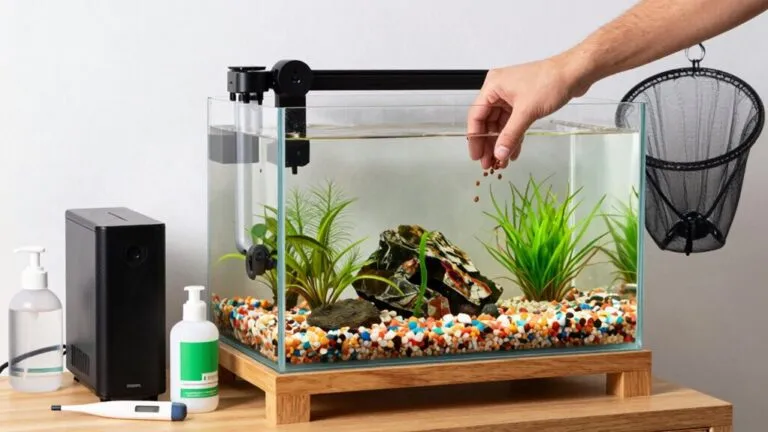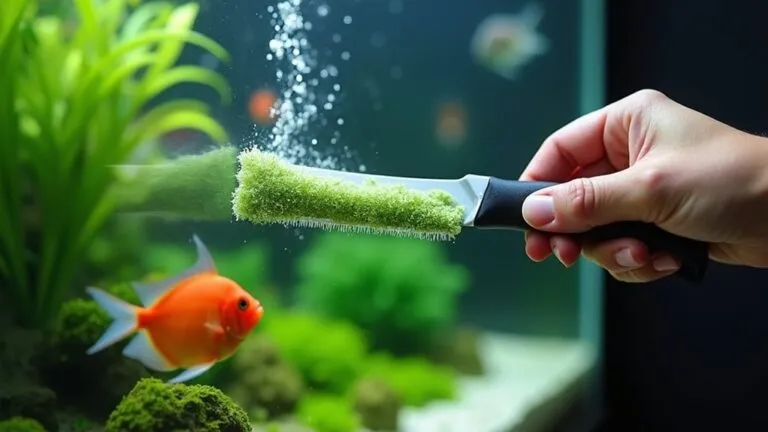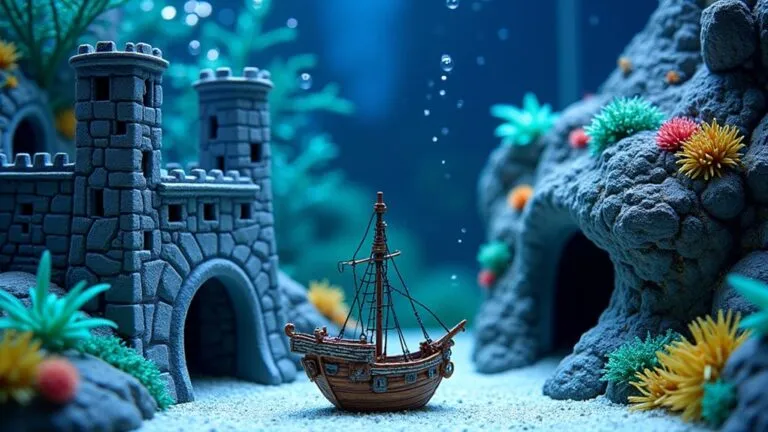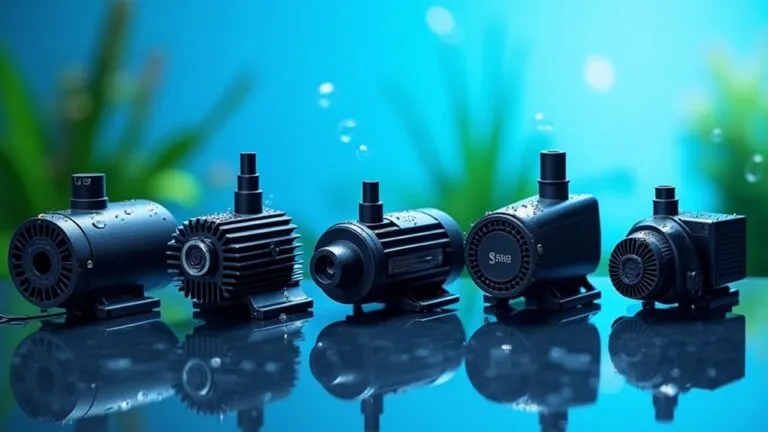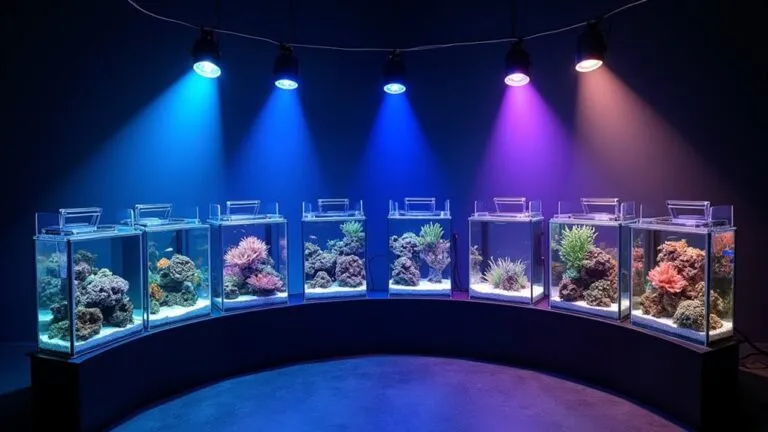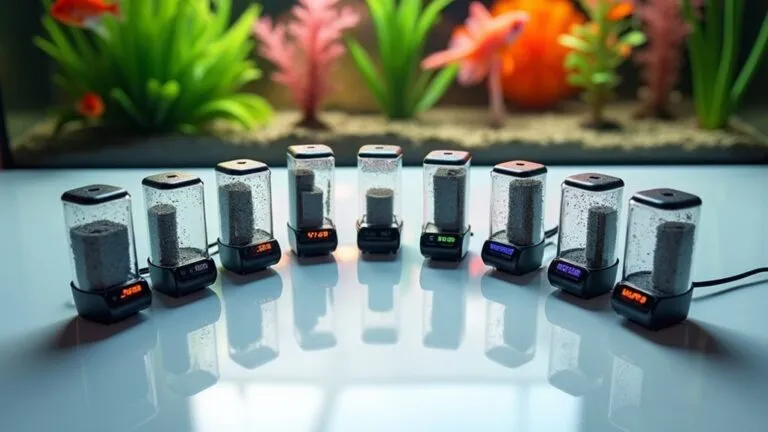Chemical filtration is a must for keeping your fish healthy and happy in their watery home. It zaps away nasty toxins, like ammonia and nitrites, that can cause serious harm to your finned friends. Using activated carbon, it grabs hold of harmful stuff and even tackles those unpleasant odors—goodbye fishy smell! Plus, specialized filters can help manage excess nutrients and heavy metals. By regularly replacing filter media and checking water quality, you're creating a stable, safe environment. Trust us, your fish will thank you as they swim around with glee. Stick around, and you'll uncover more tips for a thriving aquarium!
Contents
- 1 Importance of Chemical Filtration
- 2 How Chemical Filtration Works
- 3 Key Benefits for Fish Health
- 4 Targeted Contaminants Removed
- 5 Chemical Filtration Media Options
- 6 Comparing Chemical and Mechanical Filtration
- 7 Maintenance of Chemical Filters
- 8 Signs of Ineffective Filtration
- 9 Optimizing Filtration Systems for Aquariums
- 10 Frequently Asked Questions
- 11 Final Thoughts
Importance of Chemical Filtration
Chemical filtration plays a crucial role in maintaining a healthy aquarium environment. Imagine your fish happily swimming around in crystal-clear water, free from harmful toxins like ammonia and nitrite.
These nasty substances can be lethal if they build up, so removing them is vital for your aquatic friends' health. Regular monitoring of water parameters, including ammonia and nitrite levels, can help ensure that chemical filtration is effective in keeping these toxins at bay regular monitoring of water parameters.
Activated carbon is your go-to hero in this battle. Its large surface area adsorbs organic molecules and impurities, enhancing water quality and keeping odors at bay.
Plus, specific ion exchange resins can tackle heavy metals and excess nutrients, preventing dangerous spikes that could harm your fish.
But here's the catch: regular replacement of chemical filtration media is essential. Just like a good cup of coffee, freshness matters!
If you let it sit too long, it won't do its job effectively. By staying on top of this, you're not just maintaining water quality; you're creating a stable environment that promotes fish health and happiness.
How Chemical Filtration Works
Chemical filtration works like a superhero for your aquarium, zapping away harmful compounds that can make your fish sick.
It plays a crucial role in maintaining optimal water quality, which is essential for fish health and well-being.
It uses special materials, like activated carbon, to grab onto those nasty toxins, keeping the water clear and fresh.
Just think of it as giving your fish a spa day—clean water means happier, healthier aquatic buddies!
Adsorption of Harmful Compounds
In your aquarium, harmful compounds can accumulate, posing a threat to fish health. That's where chemical filtration comes in, especially through the process of adsorption. This is like your aquarium's superhero! Activated carbon, a key player here, has a massive surface area that attracts and binds harmful compounds, including various toxins, from the water. By doing so, it significantly boosts water quality and creates a healthier environment for your aquatic life.
But don't forget about regular replacement! Exhausted media can actually release the toxins it once absorbed back into the water. You wouldn't want that, right?
Ion exchange resins are another essential tool—they target specific ions like ammonia and heavy metals, swapping them for less harmful ones. This helps keep your fish safe and happy.
Phosphate removers also play a vital role, chemically reacting with phosphates to prevent algae overgrowth. Together, these components work as a team to protect the health of your fish.
Maintaining Water Clarity
To keep your aquarium looking pristine, understanding how chemical filtration works is key.
Chemical filtration is all about using special materials like activated carbon to improve water clarity. This amazing substance has a porous structure that gives it a large surface area, allowing it to effectively grab and hold onto harmful chemicals, organic compounds, and even unpleasant odors.
By removing these impurities, you not only enhance the appearance of your tank but also maintain a healthy environment for your fish.
Regularly replacing your chemical filtration media, like activated carbon or phosphate removers, is crucial. If you don't, you might end up with a party of harmful bacteria instead of happy fish!
Phosphate removers can also be a game changer, binding excess phosphates that lead to pesky algae growth.
Less algae means clearer water and happier aquatic life. Remember, it's all about optimal performance—cleaner water equals healthier fish.
So, take the time to understand and implement chemical filtration. Your fish will thank you for it, even if they can't say it in words!
Trust us, a little effort goes a long way in keeping your underwater world vibrant and inviting.
Key Benefits for Fish Health

How can chemical filtration enhance the health of your fish? It plays a vital role in creating a safe and thriving environment for your aquatic friends.
By effectively removing harmful substances like ammonia and nitrites, chemical filtration helps prevent toxic conditions that can stress or even harm your fish. Regular water quality checks, as noted in the importance of monitoring parameters, further support the effectiveness of chemical filtration.
With the use of activated carbon, you can eliminate not just toxins, but also those unpleasant odors that sometimes sneak into your aquarium.
Moreover, regular application of phosphate removers keeps pesky algae at bay. This is crucial because algae can hog the oxygen and nutrients your fish need to stay happy and healthy.
Let's not forget about ion exchange resins, which target heavy metals that can disrupt your tank's delicate balance.
Targeted Contaminants Removed
Chemical filtration is essential for removing targeted contaminants that can jeopardize your fish's health. By using this method, you can ensure a safer environment for your aquatic friends.
Let's take a look at some harmful substances that chemical filtration effectively removes:
- Ammonia: This toxic compound can build up quickly and harm your fish if not properly managed.
- Nitrates: High levels of nitrates can lead to stress and even disease in fish, making their removal crucial.
- Organic Compounds: Activated carbon adsorbs these pollutants, enhancing water clarity and quality.
- Heavy Metals: Ion exchange resins target these harmful ions, swapping them for safer alternatives.
Chemical Filtration Media Options
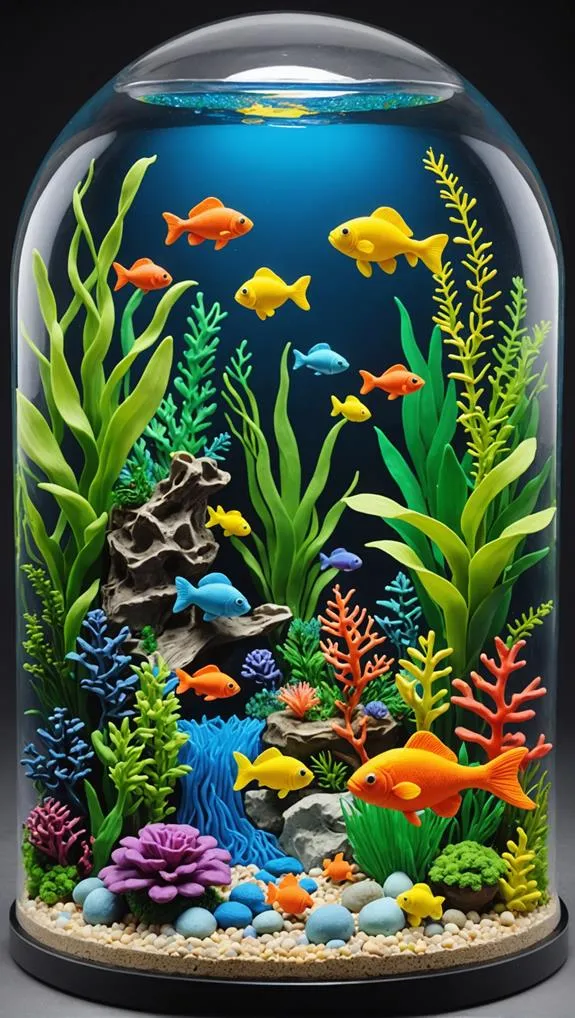
When it comes to maintaining a healthy aquarium, choosing the right chemical filtration media is crucial for ensuring optimal water quality. You've got several options, each with its unique benefits.
Activated carbon is a popular choice. It's made of tiny, porous granules that grab onto organic molecules, toxins, and even those pesky pigments that can cloud your tank. Plus, it helps remove foul odors—who doesn't love a fresh-smelling aquarium?
Phosphate removers are another great option. They usually contain ferric oxide or aluminum oxide, which react with phosphates to stop algae from taking over. You want a balanced aquatic environment, right?
Then there are ion exchange resins. These little gems attract harmful substances like ammonia and heavy metals, ensuring your fish stay safe while keeping necessary nutrients in check.
Comparing Chemical and Mechanical Filtration
Both chemical and mechanical filtration play vital roles in maintaining a healthy aquarium, but they serve different purposes. Understanding how they compare can help you create an effective filtration system that supports your aquatic environment.
- Chemical filtration targets harmful substances like ammonia and nitrites, removing them to safeguard fish health.
- Mechanical filtration, on the other hand, captures larger particles and visible debris but doesn't tackle those sneaky dissolved contaminants.
- With chemical filters, like activated carbon, you can improve water clarity and odor, ensuring your fish live in a fresh, clean space.
- Combining both filtration types enhances overall water quality, preventing diseases and stress that arise from harmful buildups.
In short, if you want your fish to thrive, remember that mechanical filtration alone isn't enough. It's like cleaning your house but forgetting to take out the trash—yikes!
Maintenance of Chemical Filters
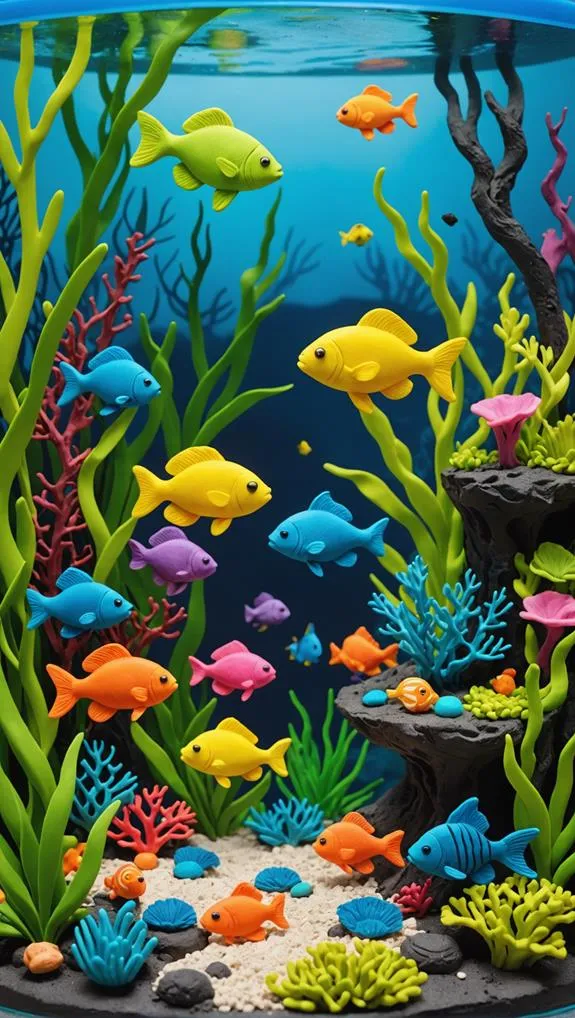
To keep your aquarium thriving, regular maintenance of your chemical filters is a must. Think of it as a spa day for your fish! By replacing activated carbon every 4 to 6 weeks, you ensure your chemical filtration effectively removes impurities and toxins from the water. After all, nobody wants a fishy vacation gone wrong.
When you're maintaining your filters, gently rinse the chemical media with dechlorinated water. This helps to remove accumulated debris without harming those precious beneficial bacteria that keep your tank balanced.
Don't forget to monitor performance by regularly testing water parameters like ammonia and nitrite levels. This way, you'll know when it's time to replace the chemical media.
Neglecting this maintenance can lead to breakthrough contamination, which is about as welcome as a surprise guest at a dinner party. It can seriously affect fish health by releasing harmful substances back into the tank.
Signs of Ineffective Filtration
If you notice your aquarium water looking cloudy or smelling a bit funky, it's time to pay attention.
These signs can mean your filtration system isn't doing its job properly, which can stress your fish out and lead to bigger problems.
Just like you wouldn't want to live in a messy room, your fish deserve a clean and healthy home too!
Water Clarity Issues
One major sign of ineffective filtration is cloudy water, which suggests the presence of suspended particles and bacteria. If you've noticed this in your tank, it's time to consider the role of chemical filtration.
Poor water clarity can lead to serious fish health issues, so let's address the main culprits:
- Algae Blooms: These pesky plants can flourish due to excess nutrients, clouding your water and stressing your fish.
- Visible Discoloration: If your water looks like it came out of a muddy puddle, it might be leached products from decorations, calling for activated carbon to clear things up.
- Organic Compounds: These little troublemakers can cause oxygen depletion, making your fish gasp for air. Chemical filtration can help remove them.
- Foul Odors: While we won't dive into that topic just yet, remember that unpleasant smells often indicate decomposing organic matter, which chemical filtration can clear away.
Unpleasant Odors Present
Unpleasant odors in your aquarium can be a troubling sign that something's not quite right with your filtration system. If your tank starts to smell like a forgotten gym sock, it's time to take action!
These foul odors often indicate deteriorating water quality, usually due to organic waste and toxins building up in the water. Chemical filtration is your best friend here.
Activated carbon, a superstar in chemical filtration, effectively adsorbs those nasty dissolved compounds that cause bad smells, keeping your aquarium environment clean and inviting. When you regularly maintain your filtration system, you prevent the buildup of harmful substances like ammonia and nitrite, which not only stink but also threaten your fish's health.
If you let those odors linger, you could face a significant filtration failure. This can lead to an unbalanced ecosystem, increasing the risk of fish stress or disease.
To tackle odors from excessive algae growth, consider adding phosphate removers to your setup. By doing so, you'll promote a healthier, more beautiful aquatic habitat where your fish can thrive—and who doesn't want happy fish?
Optimizing Filtration Systems for Aquariums
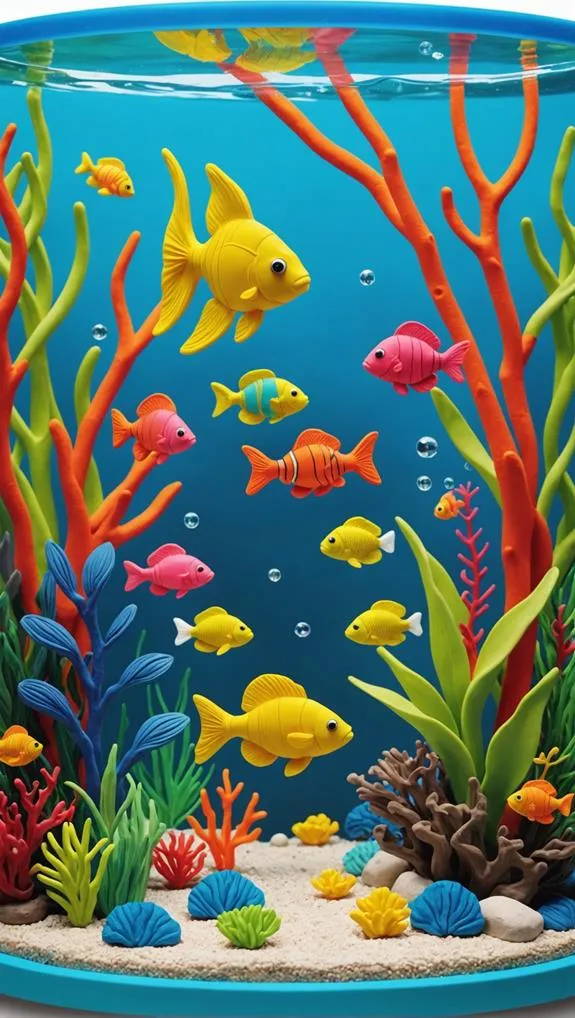
To ensure your aquarium thrives, optimizing your filtration system is key. A well-functioning filtration system is vital for maintaining water quality and the health of your fish. Here are some simple tips to get you started:
1. Choose the Right Filters: Make sure your aquarium filter is appropriate for your tank size and fish type. Not all filters are created equal!
2. Use Activated Carbon: This magical substance absorbs unwanted particles and chemicals, ensuring your water stays crystal clear and free from odors.
Think of it as a spa day for your fish!
3. Monitor Water Parameters: Regularly check ammonia, nitrite, and nitrate levels. Knowing your water quality helps you catch potential issues before they become a problem.
4. Replace Filter Media: Don't forget to change your activated carbon and other chemical filter media regularly.
Saturated media can't do its job effectively, and that's not fair to your aquatic buddies.
Frequently Asked Questions
Why Is Chemical Filtration Important?
Chemical filtration's important for maintaining water clarity and chemical balance in your aquarium. You're using detoxifying agents to remove toxic compounds and pollutants, ensuring fish welfare through effective aquarium maintenance and promoting a healthy aquatic environment.
Do You Need Chemical Filtration in a Fish Tank?
Absolutely, you need chemical filtration in your fish tank. Think of it as a lifeguard for your aquatic friends. Different filter media options enhance water quality, ensuring optimal conditions tailored to specific fish requirements and reducing maintenance efforts.
Why Is Filtration Important in Aquariums?
Filtration's vital for aquariums, maintaining biological balance and ensuring water clarity. It aids in ammonia removal, nitrate control, and tank cycling, while reducing fish stress and algae growth, thus providing habitat stability for your aquatic friends.
Why Is Filtration Important in Aquaculture?
In aquaculture, effective filtration ensures water quality by removing waste, balancing nutrients, and preventing disease. It stabilizes habitats, controls pH and oxygen levels, fostering a healthy aquatic ecosystem for thriving fish populations you care for.
Final Thoughts
In the grand underwater world, healthy fish are like happy kids in a candy store—who wouldn't want that? Chemical filtration plays a vital role in keeping your aquarium clean and your fish thriving. By removing harmful substances, it ensures a safe haven for your aquatic friends. So, don't skimp on this essential part of your tank's health! With the right filtration, your fish can swim happily, and you can enjoy the vibrant life within your aquarium.

